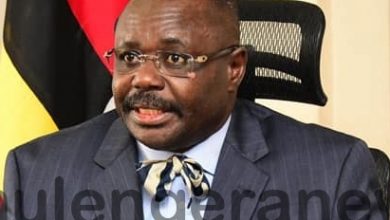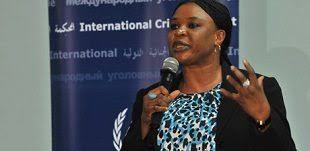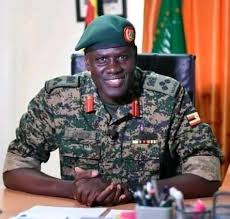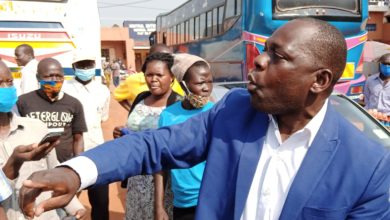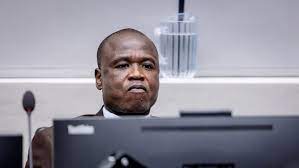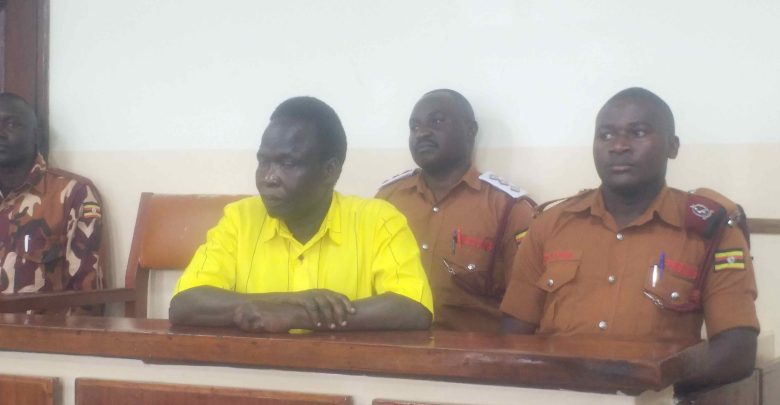
Global Politics
UGANDA: INTERNATIONAL CRIMES DIVISION COURT HEARING HANGS IN BALANCE AS ATTORNEY GENERAL REFUSES PAY REPARATION
Gulu High Court ICD, December 4, 2024
(By Okumu Livingstone Langol)
The Gulu High Court’s International Crimes Division (ICD) has been embroiled in a legal standoff over the government’s responsibility to pay reparations for victims of Thomas Kwoyelo (also known as Latoni), who was convicted for crimes committed during the insurgency in Northern Uganda. The Attorney General of Uganda has denied the government’s obligation to pay reparations, sparking heated exchanges in court.
“Why should the government pay reparations for crimes committed by Thomas Kwoyelo?” a state attorney questioned during the proceedings.
In response, Justice Stephen Mubiru asserted that it is the duty of the Ugandan government to protect civilians who were forcibly displaced and held in Internally Displaced Persons (IDP) camps for two decades, resulting in mass killings and destruction. “The Attorney General and the government of Uganda are obligated to pay reparations, as Uganda is a signatory to the UN’s International Convention,” Justice Mubiru warned.
The court session was presided over by a three-judge panel, led by Justice Michael Elubu, who was reviewing applications from both the Amicus Curiae (friend of the court) and the victim’s counsel, urging the court to order the government of Uganda to provide reparations to the victims.
State Attorney’s Defiance
Principal State Attorney Mr. Mwaka repeatedly rejected the notion that the government had a responsibility to pay reparations, arguing that the government had already provided support through initiatives such as the Northern Uganda Social Action Fund (NUSAF) and the Peace, Recovery, and Development Plan (PRDP). He further claimed that reparations were not a legal requirement and questioned whether the court had any basis for ordering such payments.
Justice Elubu asked the Attorney General, ICJ ruled DR. Congo that the government failed to protect civilians, back in Uganda the government failed to protect the victims in Northern Uganda, what is your answer?
The Principal Mr. Mwaka sort back and says he has read this ICD judgement for all week, i have not found ruling that the government should pay for the reparation, but remedy. which the government have done through NUSAF, PRDP, NUREP. and there no need for the government to pay for the crimes committed by convicted Thomas Kwoyelo.
Justice Mubiru raised concerns about the lack of legal framework in Uganda for reparations. “If we make an order for reparations, where will the funds come from?” he asked. He noted that Uganda does not yet have a comprehensive law on reparations, making this case the first of its kind in the country.
Tensions in the Courtroom.
During a brief press interaction after the court adjourned, ICD Registry Juluiet Harb Atanga, while addressing member of the Northern Uganda Media Club, observed the growing tension in the courtroom. She claimed that the Deputy Director of Public Prosecutions (DPP), George William, failed to represent the victims’ interests adequately. Instead, he sided with the Attorney General, leading Justice Elubu to question why the DPP was seemingly distancing himself from the victims whose case he had previously represented.
Atanga suggested that William feared repercussions from the Attorney General, as he would likely face disciplinary action for supporting the victims’ claims for reparations.
“The Deputy DPP is afraid for his job and will not speak out against the Attorney General,” Atanga commented.
Défense Counsel’s Argument
Caleb Alaka, lead Défense counsel for Kwoyelo, argued that the Ugandan government failed to protect the Acholi people during the insurgency, forcing them into IDP camps for 20 years. He contended that the Uganda People’s Defence Forces (UPDF) failed to protect civilians from the Lord’s Resistance Army (LRA), and as a result, the government should be held accountable for the suffering of the victims.
Caleb Alaka, we have our affection on the accused convict, the position of Attorney General denial that the government of Uganda does not have to pay for the reparation of this court proceeding is an echelon. the misconception demeaner contradiction of civil matter or court, but we are handling international criminal cases.
The Attorney General is found face on tort law, but we did not see international law. My Lord, the case of the Geneva Convention of international law involved the settlement party.
It is on record that the majority of affected people who were in IDP camps were forced from their village from the all-entire districts of Northern Region and they were supposed to be protected by UPDF, but the UPDF failed to protect them.
There is an affidavit filed by a witness called Auma Josca at page 7, My Lord, in that affidavit individuals of registered victims are to be empowered financially and they should get free education. The community who was affected lived concentration camps compared to Nazi concentration camps, the communities lost their households property, wives, children and husband, they should pay reparation.
“The affidavit sworn by one of the witnesses that the IDP camps were occupied by 27 people whose names were listed, for example, the soldiers occupied the victims land, apart from that nature of state obligation. One of the Attorney General wants to turn this court into a court of appeal, we are going to alter this court. “Senior counsel Caleb Alaka fumed.
The ICD adopts the best practices of international law that is why the court says international law is applicable in Uganda. My Lord, in my affidavit, Thomas Kwoyelo he is as poor as mice in the church. He was abducted while 12 years old and taken in the bush, where he stayed when the representative of the government of Uganda grabbed him and took him to Uganda.
The accused says he has no access to his country and has no sources of employment, My Lord, there is a duty of defence to investigate the convict accuser if he has any evidence, he has property. The state defence never did and spoke.
We are making a mockery while the Attorney General says 133 victims should be paid, the court should order the Attorney General to pay for the reparation. Unfortunately, the DPP who presented witnesses threw away all the witnesses. This court has the right to order reparation.
“This is court justice, this court sentenced the man to 40 years in prison, and can order the victims to pay.” Uganda’s most senior lawyer Caleb Alaka reasoned.
Ivan Ochieng, one of the accused co-counsels made rebattle too
Ivan Ocheing, says you should order the Attorney General to pay for reparation, the victims are not necessarily a victim. but witnesses who came to court only the victims we understand them are person who suffered the war, consider the outreach report, the closes we could come in this villages are the round grass thatch houses of his mother’s Kwoyelo.
You heard the witnesses say their children of the convict who could not say this is my father land, the court cannot attach any property of the convict.
Without his ability to pay the reparation, when the Attorney General says the court should order the convict to pay for reparation, then it is a mockery of justice. What we cannot come with is an order and order which was made that the court ruling of 2010 should be paid for the convict funds.
“Don’t know how much funds are ordered to be paid for the convict, the order is not in law because it was not done with although it was ruled.” Ivan Ochieng criticised.
“What court is pursuing is the failure of the UPDF to protect civilians,” Alaka said. “The government of Uganda forced about two million people into concentration camps, where they suffered unspeakable hardships. The government should have intervened to stop the killings and abductions.”
Justice Elubu echoed this sentiment, pointing out that the state could be held accountable for failing to protect civilians, citing a ruling by the International Court of Justice (ICJ) in the case of the Democratic Republic of Congo, where the government was found to have failed in its duty to protect its citizens abroad.
“The government failed to protect civilians in Uganda, just as it failed in foreign territories,” Justice Elubu stated.
The Legal Conundrum
As the debates continued, Justice Elubu pressed the Attorney General on whether Uganda, as a signatory to the UN Convention on the Prevention and Punishment of the Crime of Genocide, had a responsibility to provide reparations. The lack of clear legislation on reparations in Uganda has created a legal vacuum, leaving the court in a dilemma over how to proceed.
“We are dealing with an international criminal case here for our case we need to focus on the law, for example, if we talk about the law of reparation is not under this law is not in Uganda, this the first time Uganda Judiciary is dealing with separation. and let the victims counsel, the State Prosecutor DPP who has been representing those witnesses who are the victims also sources for reparation from other countries which have been dealing with reparation.
We feel seated that the statement is coming from the bar like the Principal State Attorney.”
,”
stated Alaka, emphasizing that Uganda should adhere to international law principles when considering reparations. He argued that the victims in the IDP camps were entitled to compensation for their suffering, including financial support and access to education.
“The IDP camps were akin to Nazi concentration camps, and the victims lost everything – their homes, families, and livelihoods. Reparations are a fundamental right,” Alaka added.
Court’s Challenge
Justice Mubiru acknowledged the challenges faced by the court in making an order for reparations, especially given the absence of a comprehensive reparation policy in Uganda. He suggested that the court might need to consider international practices in determining how reparations should be administered.
“This court is grappling with a new issue,” Justice Mubiru said. ”
If we order reparations, we need to know how much each victim should receive and where the funds will come from.”
The International Centre for Transitional Justice’s (ICTJ) Intervention
During the proceedings, the International Centre for Transitional Justice (ICTJ) filed a submission in support of reparations, urging the court to consider international standards for reparations. The ICTJ’s application was rejected by the court on the grounds of bias, but their counsel, George Okitoi, argued that their intervention would assist the court in reaching a fair decision.
“Our submission aims to help the court arrive at a just and comprehensive decision regarding reparations,” Okitoi stated, emphasizing that the ICTJ’s legal expertise in transitional justice would provide valuable insights.
The Dilemma Continues
As the hearing concluded, Justice Elubu acknowledged the absence of a clear legal framework on reparations in Uganda, but emphasized the court’s responsibility to address the needs of the victims. He gave the ICTJ 24 hours to prepare a workable reparation policy, detailing how the victims should be compensated.
The ICTJ applicant says, My Lord. as an affidavit in support of the application. If their application is granted it will not be prejudicial to or inconsistent with the rights of the convict.
The points of law on which ICTJ wishes to make submissions are novel and will aid the development of jurisprudence, specifically on the aspect of reparations proceedings in Uganda before the ICD.
George Okitoi argued court that the applicant aims to assist Honourable court to come to a just and comprehensive decision on reparations, and an intervening party will provide a distinct and helpful domestic, international and comparative in the petition and will offer useful focused and principled legal submissions to assist the court in arriving at a just and fair decision, and would serve the interests of justice.
George Okitoi pleaded in his submission that their applicant to this court’s order at the sentencing held on 25th of October 2024 under order 5, the applicant prays that his application is granted in the interest of justice.
“Although we have heard submissions from both the victims’ counsel and the Amicus Curiae, the lack of a reparation policy in Uganda complicates matters,” Justice Elubu concluded. “We must find a solution, but the absence of legislation makes it difficult to proceed.”

